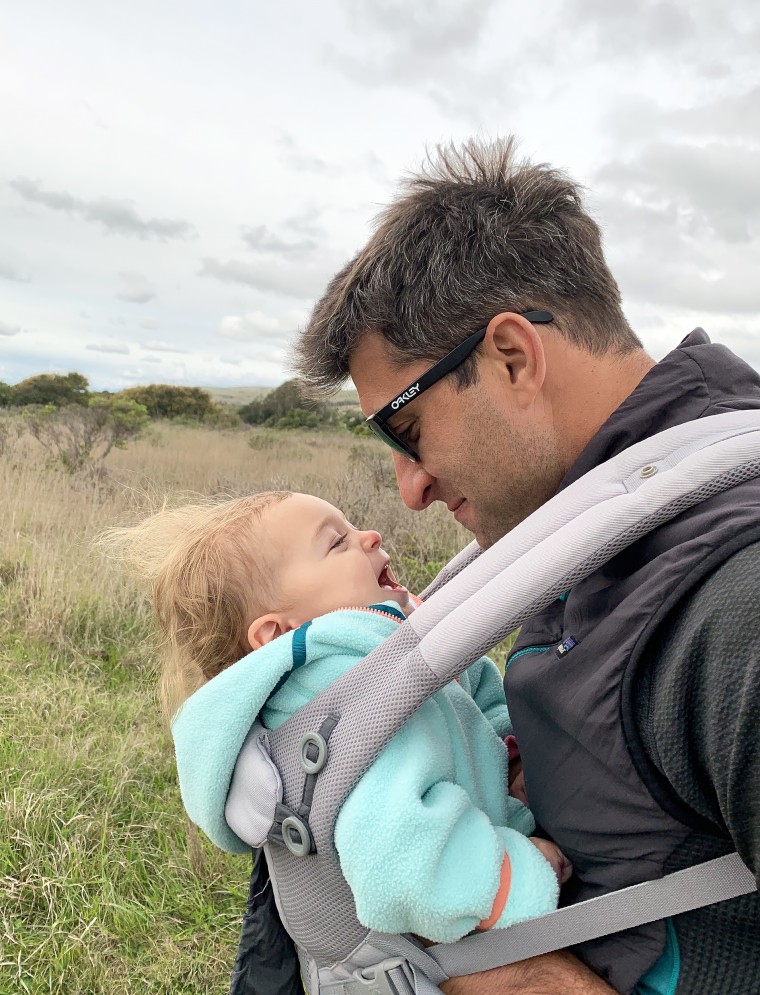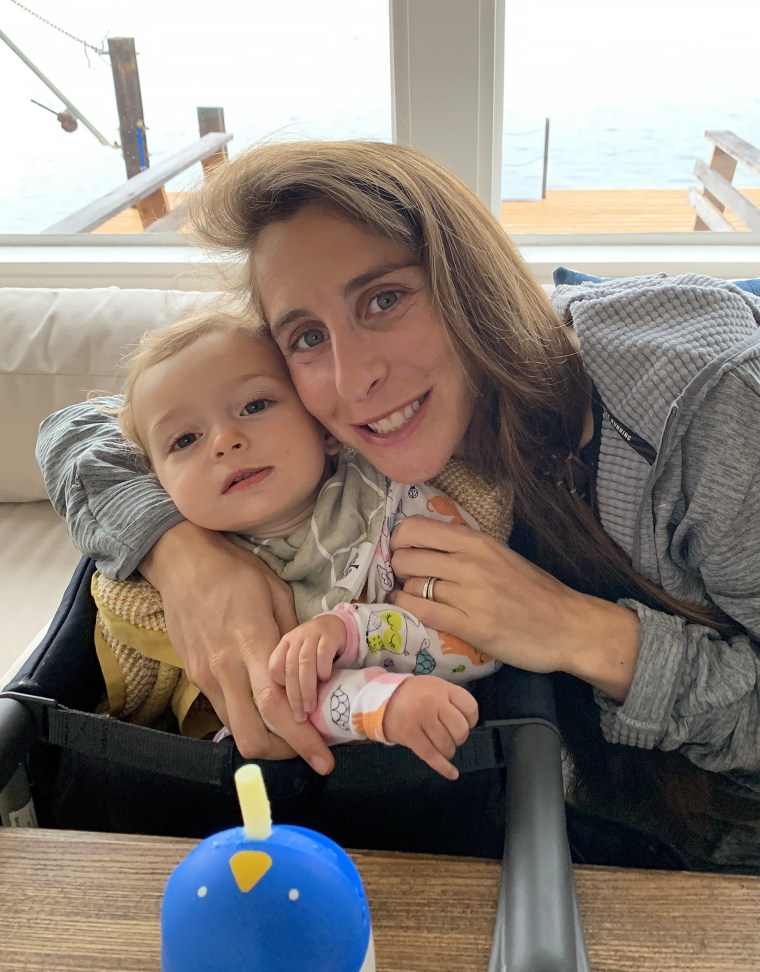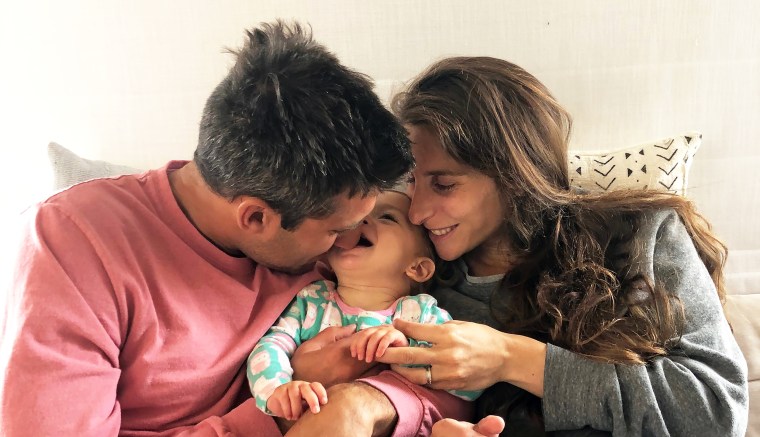In 2022, Myra Sack wrote a personal essay for TODAY.com about welcoming a new baby while she was still grieving her oldest daughter, Havi, who died in January 2021, at age 2, of Tay-Sachs disease. Sack, who lives in Boston, recently published a memoir about Havi, "Fifty-seven Fridays: Losing Our Daughter, Finding Our Way," out April 2. The following excerpt from the book includes journal entries from both Sack and her husband, Matthew Goldstein, in the months before they said goodbye to Havi.
May 23, 2020. Havi is 20 months old.
A letter to Havi from her father:
Hi Peanut,
For much of my life — or maybe all of it, really — milestones have been a dominating focal point. I remember being a little kid, maybe in third grade, standing in the outfield of Bayside Park with the wind and the fog blowing in hard off San Francisco Bay. I would look over through the chain-link fence at the game being played in the neighboring field by two teams in the Babe Ruth League. The boys were big and the pitching was lively. One day that’d be me.
And so it continued. I kept my eyes up, always looking ahead to the next milestone: middle school, high school, college, medical school, residency and so on. And when you appeared, nearly 21 months ago, a whole new list of milestones, which I eagerly anticipated, appeared in my life. That is, until they were delayed, or became different. And then the worst thing happened: The milestones all slipped away. Suddenly I knew there would be no milestones for you. For a moment, it had seemed like your mom and I had everything, and our world was one of progress forward, but then slowly, insidiously, everything had dissolved until the moment came when your mom and I looked at each other and realized something was not right. And since that day, we’ve been walking steadily backward through and past the milestones that you had crossed before. It’s tragically disorienting.
This week we abandoned your spoon and switched to feeding you with the sippy cup with the straw. Not so long ago you could use a toddler spoon, holding it in your hand and scooping food into your own mouth. But that spoon has sat in the drawer for months now, giving way to smaller spoons and smaller bites. We used to sit for hours with you, making our way through a finely mashed sweet potato; we’ve always cherished mealtime because you seemed to get so much joy from it. But this week we put away your last spoon and now everything gets puréed in the blender to be smooth and just thick enough for you to slurp from the sippy cup without choking.
There is a photo in our kitchen, which we hung up after we got back from our Havimoon, showing us all sitting at our daily breakfast table in Del Mar. Your hand is resting on top of a small bowl full of fresh fruit, your beautiful long fingers curved perfectly around a blueberry. I’ve been staring at that photo this week, losing myself in trying to get back into that moment to remember what it looked like to see you feed yourself. And sometimes I can’t remember completely, and that scares me.

You haven’t been sleeping well this week, and Mom and I have been taking turns being up with you. You’re waking up crying, with your arms and legs tense and rigid and extended. You seem so uncomfortable. We’ll rub your legs and your stomach, sway you back and forth, and eventually you’ll calm back down and fall asleep on one of our shoulders or back in your rocker. But on the worst nights, which, unfortunately, have been most of them, you’re up again 10 minutes later. And that continues, straight on till morning, as Wendy said to Peter Pan. So this week we’re facing another milestone: considering starting medication to help with your muscle tone and your sleep. I don’t think we’re afraid of the medication itself or even what it represents as a milestone of destructive progress. But we are afraid that the medication will sedate you and steal from us your little bit of personality, of engagement, of fleeting laughter, that remains. People have warned us that these aspects of you will go away too, but it just feels too soon.
We are afraid that the medication will sedate you and steal from us your little bit of personality, of engagement, of fleeting laughter, that remains. ... It just feels too soon.
Our time back in Boston has been good to us so far. Few days have passed when there hasn’t been a food delivery on the front steps: lasagna, donuts, muffins, brownies, milkshakes, smoothies, beer for Dad. So we’re all eating well. And the weather has been incredible, which means lots of time outside for you, which you love. Mom and I steal away for walks with you in the late afternoons and we fall in love with your dimples all over again, one stride at a time.
A little robin made its nest in a small tree off the back deck and there are three little babies chirping away to you every morning.
But even though Boston is being good to us, it feels harder to make sense of things here, where the fabric of our life before Tay-Sachs hangs in shreds on the fencepost of a milestone we passed long ago.
We love you. -Dad
July 18, 2020. Havi is 22 months old.
“It’s a tragic privilege to know you,” Dr. Jo says. “I wish you didn’t have to know me.” Matt and I are sitting on our back deck, my cell phone on the table between us, taking our first call with the revered grief therapist Dr. Joanne Cacciatore. Dr. Jo is ours for an hour every other week, thanks to Aunt Erin, who gifted us these sessions.
“I can’t cure your grief. Nor would we want that,” Dr. Jo says. “Grieving is a form of loving Havi. Loving everything you have with her, and every moment you won’t have.”
Immediately I feel safe with Dr. Jo. “I think we’ve found our person,” I say to Matt when the session ends. Matt nods. “I think we have.”
Matt and I meet with Dr. Jo by phone once every two weeks. Mostly, we take her calls in Havi’s room. Her soft, comforting voice sounds like a smile. Once we’ve said our hellos and she’s asked about Havi, she takes a deep, slow breath. Reflexively, we do too: a deep inhalation followed by a long, audible exhalation. Then we’re ready to talk.
“Where is your grief living today?”
I start. “It’s in my throat. Sometimes I swallow a few times to make sure I still can. And then I wonder why I get to swallow if Havi won’t be able to at some point.”
Jo says, “It’s cellular, isn’t it? The pain and the love of a mother.”
“Yes," I say. "And I’ve been clenching my fists a lot too, which is new.”
“I’ve heard that from a lot of parents. I wonder if it is a demonstration of an inner protestation: How could this be?”
Matt jumps in. “I’ve been in a state of disbelief. So that resonates.”
“Yes,” Jo agrees. “Disbelief is merciful. Gives us time to move mountains one stone at a time.”
Wow, I think. I love that. In unison, Matt and I each take a deep breath. Feeling safe makes it so much easier to breathe.
Dr. Jo lost her daughter too. She knows the depths of our grief. She also has 25 years of experience working with families like ours, while teaching her students at Arizona State University about the complexity and anguish of losing a child. In our conversations with her, it’s always OK to feel what we’re feeling: anguish, numbness, fear, despair, anger, impatience, withdrawal. “As we work with our feelings,” she tells us, “they become conscious. Then we can trust them.”
“Your loss, your tragedy is abnormal,” she says. “Your feelings are not.”
Dr. Jo ends every call with the same words. “Give that beautiful girl a kiss from her friend in Arizona.”

November 2020. Havi is 26 months old.
A letter to Havi from her mother:
Dear Havi,
I dread the day when I’ll sit down to write to you and I can’t reach out to squeeze your hand, run my fingers through your hair, massage your little calves, or plant a big kiss on your red lips. And while it’s true that your energy and your spirit have already transcended your physical being, there is so much of you encased in your gorgeous body. Trying to make sense of life without you, you who we brought into the world only two years ago, feels like emotional amputation.
But today, I write with you here. And even though as I write you startle or choke or stiffen, I feel you and pick you up in my arms and hold you close when I need to be recentered. You shouldn’t have to play that role, but you’ve become that person for me. The person I look to when I want to see the best in others or when I need perspective or patience, or purpose. And I’m scared of who I might become when we lose you. When you’re out of reach. I can only hope that I’ll find the softness and strength you bring with you everywhere you go; the way you, without uttering a word, say so much about what is important and what is not; the way you, without ever taking a single step, have your footprints all over our incredible community and this beautiful Earth.
Love, Mom
December 2020. Havi is 27 months old.
I am sitting with Havi in her rocking chair as we inch up toward the anniversary of Diagnosis Day, December 17. I gaze out her bedroom window at the gray sky and the cold air. My mind wanders around the moments of “this time last year” when we were so f---ing hopeful, blind to the possibility of such devastation. I rub my lips against Havi’s chin, and I can’t stop shaking my head. And then I sink into the chair, readjust Hav’s head against my chest, and sob.
This excerpt has been edited. Copyrighted by Monkfish Book Publish Company 2024.
